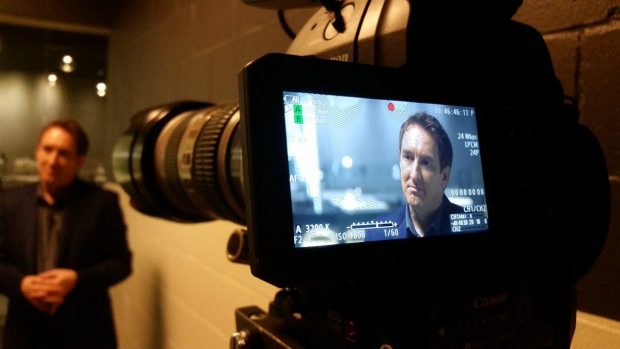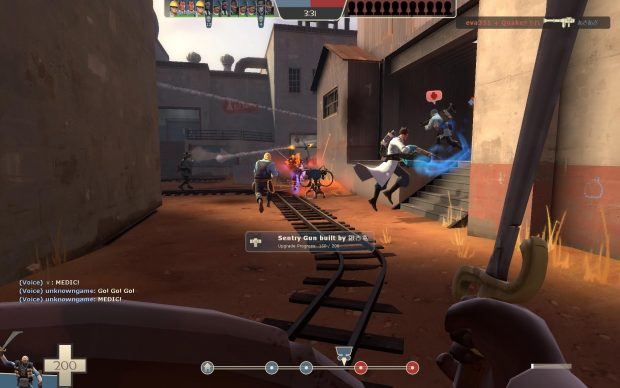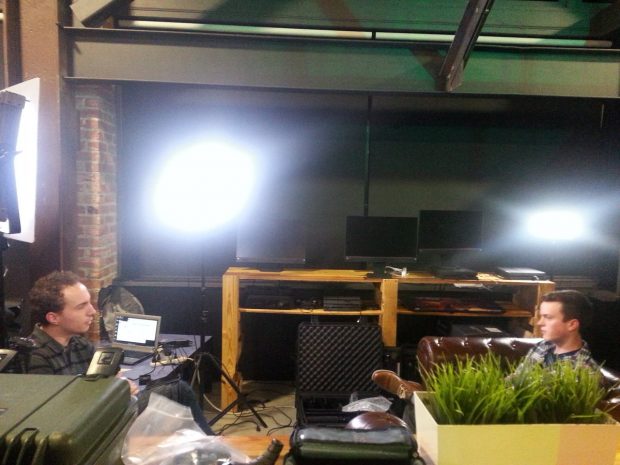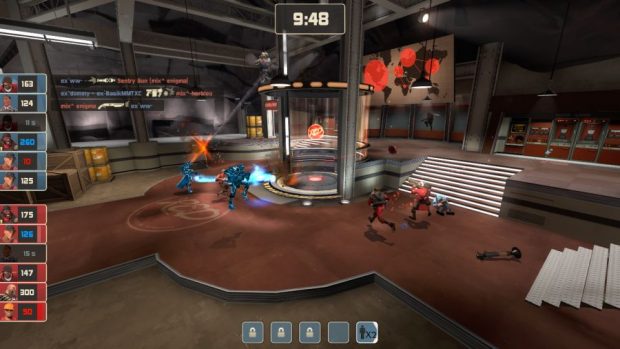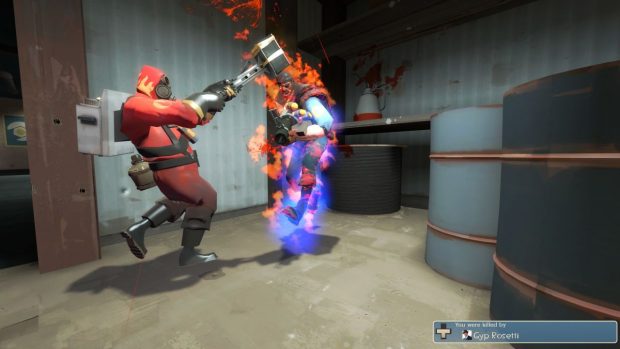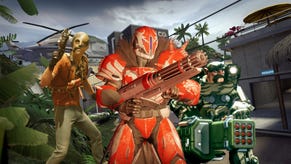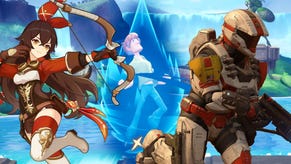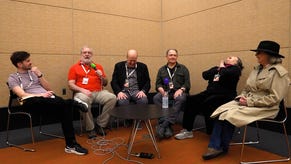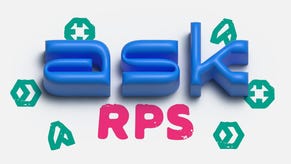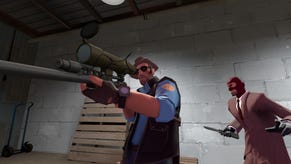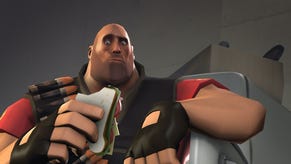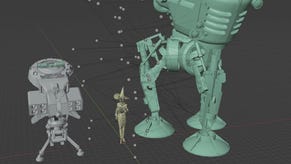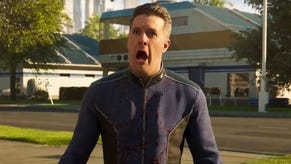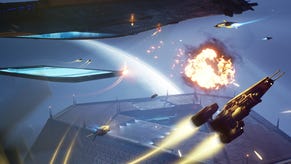We spoke to the co-director of Ready Up, a documentary showcasing competitive TF2
"TF2 being a small esport doesn't bother me at all"
Ready Up opens with a shot of the CS:GO grand finals at ESL One. The size of the stadium dwarfs the players on the stage, who all wear deadly serious expressions. There are thousands of people in the audience, many of them frantically waving inflatable tubes covered in sponsorship scrawls. A member of one team makes a clutch pistol play, and the room erupts in a roar of screaming and thunderous chanting. The player solemnly acknowledges the applause with a showboating chef kiss, but he doesn't look like he's having much fun.
Then, we change rooms. A few dozen people are sitting in front of a screen, watching their friends compete at a Team Fortress 2 LAN event. The players seem focused, yet relaxed. "Ah, I'm dead" says one of them, half-grinning at his misfortune. At the heart of the competitive TF2 scene, it transpires, is a community with bonds that transcend the tribalism you might see in other esports. I spoke to Alex "Dashner" Pylyshyn over email, who co-directed Ready Up alongside Ness “Uberchain” Delacroix, about the past, present and future of competitive TF2.
RPS: Let’s start with a question you put to your interviewees towards the end of the documentary: what is TF2 to you?
Alex Pylyshyn: This is such a tough question to answer. I've spent the last hour or so struggling to put it into words. TF2 has had so many different meanings to me over the past seven years.
It's been one of the most entertaining games I've ever played, helping distract me from my struggles with depression and providing me with the most unique experience I've ever had in a competitive video game.
It's been a teacher, helping me learn better interpersonal skills and nearly all the employable skills I have today as a broadcast producer, video editor, and esports observer.
It's been my second family. The closest relationships and most memorable experiences in my life have come from this community and the incredible events we put on. I can't imagine my life without it. This game has defined me as a person and has defined the past 8 years of my life.
RPS: You’ve spent the past one and a half years working on Ready Up. Did you always envisage it as such a large project, and were there any points where it looked like it wasn’t going to come together?
Alex: This is going to be a bit of a long answer so you'll have to forgive me. I don't think we thought it would be this big at the start. In fact, I'm not sure if we ever really had any clear concept of what this project was when it began. We had a very turbulent start to the production of the film, quite literally it was just us taking a Canon Rebel DSLR and saying "Hey let's make a documentary about producing TF2" after we were inspired by some B-Roll footage a colleague of ours shot at a TF2 event in 2015. Initially, we were exclusively going to focus on the work of the event organizers and DIY broadcast crews that help make these events happen. Marketplace.tf basically gave us a blank check to produce it after being really impressed by a proof of concept trailer Uberchain produced and we went from there. The first two events we covered (DreamHack Summer 2016 and Insomnia58) provided serviceable B-Roll, but were disasters behind the scenes, Insomnia58 in particular due to my visa issues entering the UK at the time and the stressful atmosphere that caused for both the documentary and the production of the entire event. We had no real idea what we were actually shooting, no planning at all beyond giving cameras to our volunteers and saying "Shoot B-Roll!". We were requesting interviews with people last second, most of whom turned us down since we were requesting them right as they were about to leave for home after a hectic weekend.
Our next event was Tip of the Hats 2016, a live studio charity event organized by the TF2 community. We had generously been granted permission to film on-site and conduct interviews with many of the staff there. At this point, our morale was non existent. I vividly remember Uberchain and I basically emotionally crashing the day before we began filming just because things were going that badly for the project up until then. Cancelling the entire project, or at least ending my involvement with it, was a very real possibility. The next day we brought Sideshow and Admirable, two extremely notable community figures in TF2, up to our hotel room to shoot an interview. I left at that point since I also had production responsibilities for the event to take care of, but later reviewed the footage in the evening after my work was done for the day. The footage was beautiful, the audio that was recorded was crisp and clear, and more importantly the stories these individuals had about the game and it's community were incredible. By the end of Tip of the Hats, we had finally collected a core of incredible interviews from many historical figures in the scene that we could build the project around, and made the film's most important decision: We expanded our focus from event production/execution to the entire competitive TF2 scene. The stories we were getting from these people just had to be told.
It was also around this time that we decided to convert our vacation to watch CSGO at ESL New York to a shoot for the film with the initial idea of contrasting TF2 with other esports scenes. ESL generously gave us press passes last second so we could bring equipment in and gave us interview time with a lot of notable CSGO figures (I need to give a special thank you here to Chrystina Martel and Anna Rozwandowicz at ESL for giving us access to this event at the last moment when they were already completely booked when it came to media). We sat down with Paul "Redeye" Chaloner, who used to host and cast TF2 events at the Insomnia LAN series in the early days of the game. To this day, I think it's one of the most powerful and important interviews we shot for the entire film. Despite labeling himself as an outsider, Paul's words about our scene and community (the first time I've heard us called a 'family') hit so close to home. After we finished the interview, I knew that we had to finish this project and that it had the potential to be huge. I've said it many times already, but I can't overstate how grateful we are to Paul for talking with us. It's no exaggeration that he likely saved the project.
RPS: Measured by total prize money, TF2 is only the 59th biggest esport in the world - why do you think that is, and does it matter to you?
Alex: As Enigma says in our film, it's just a matter of bad timing. TF2 was released at a time where competitive gaming as a spectator sport just wasn't where it needed to be. A lot of people forget that Twitch didn't even exist when TF2 was released in 2007. The first competitive broadcast I ever did for TF2 was on Twitch's predecessor, a very buggy and unpleasant Justin.tv. By the time Twitch became a thing and the esports "boom" truly happened with the rise of titles such as CSGO, Dota 2, and League of Legends, Valve had already more or less committed itself to making TF2 a casual game. That's simplifying things a tad bit but that's my take on why the game never took off as an esport and remained a fairly low-key competitive game.
The truth is, TF2 being a small esport doesn't bother me at all. It used to be a problem that haunted a lot of us in the scene, and we struggled for years to achieve our dream of TF2 becoming a huge esport title and sharing the stage with games like CS and Dota. I think now (and the film really drives this point home) most of us realize that if TF2 had gone down that path, the community would have lost it's most unique aspects and we would never have been able to truly recapture it. We're all tightly knit and close because of how small our scene is, almost everyone at an event knows one another in some capacity. I like to think that once or twice a year, we can go to an event and pretend for just a few days that we're a huge successful esport, but after the games wrap it's extremely comforting to be able to just go to the bar at an event and know that there's an almost certainty that I'll find someone I know there and be able to chat with them.
It's kind of funny looking back and acknowledging the irony of our pursuit to make TF2 a premier esport, not realizing at the time it would have gutted us as a community. I think I was able to see this difference the most when I started working Overwatch events, particularly MLG Vegas at the end of 2016. NRG was playing there with a lineup of former TF2 pros, many of whom were very good friends of mine. There was just something very different about them while they were at the event and competing, a seriousness that completely threw me off. It was gone by the time the event ended and we were able to hang out, but once a game becomes your profession and your career depends on winning or losing, you lose a lot of the community feel that defines a game like TF2.
This isn't to say we don't want financial support in TF2, we always welcome new sponsors and a boost to an event prize pool to bring more hype to an event. At the same time, I'm not really keen to see TF2 on the big stage at IEM Katowice any time soon.
RPS: The documentary talks about the failure of TF2’s competitive matchmaking, which was introduced in 2016, but what exactly are the problems with it? Do you think those are likely to change, and if so will it matter at this point?
Alex: So this is kind of embarrassing, but I'm actually probably not the right person to answer this fully. The truth is I rarely play any video games these days, I stopped playing TF2 in mid 2015, and only really played competitive matchmaking once in the game. Once video games became my career, it was a hobby that slowly faded away for me, and I really don't play many games at all anymore. I can try to answer from my experiences hearing others discuss the topic however. My understanding is it's a variety of issues that have snowballed into making MM unplayable. Examples include not being able to customize your network interpolation and graphics settings (huge in a game like TF2 that is extremely unoptimized), not having placement matches to establish an initial rank for a new player, swarms of cheaters, using map pools + rulesets that are not ideal for competitive play (all matches are best-of-3s and no class or item limits are enforced, creating major balance issues). There's also just no incentive to play it really.
I do believe Valve when they say they're trying to rework the game mode, so I expect fixes to come eventually. I really am unsure if these fixes will have a profound impact however. I've always been the opinion that a substantial amount of growth in the scene depends on a significant overhaul of TF2 as a game (ie. porting the game to the second iteration of the Source Engine and making major design changes) or a full-blown sequel. A working competitive mode built into the game would be welcomed by our community, particularly since it's something we've been clamoring about for years, but I struggle to see a situation where it ushers in a new renaissance for the game on it's own. I personally feel like that we as a community are more likely to make that renaissance happen on our own unless more changes happen.
RPS: What do you think Valve could and should do to support competitive TF2?
Alex: On the extreme side of things, as I mentioned earlier, the best thing that could happen is a full blown sequel or overhaul to the game that gives it a serious new shine of paint. One of TF2's biggest drawbacks is it's age. It's unbelievable to me that we're still playing a game based on a 2007 iteration of the Source Engine, and it shows, the game is incredibly unoptimized and many players depend on performance configs that make the game playable at high frame rates. I also just feel like that, from my own personal perspective, you can only keep playing the same experience for so long. I still enjoy watching competitive, but I couldn't imagine just booting up the game and playing a normal game, even with friends. The experience of playing it outside of a competitive environment grew stale for me awhile ago. That said, I definitely acknowledge there are tons of people still enjoying the same TF2 experience after a decade, and this is likely just my sole personal opinion.
I am a realist though and don't expect a Team Fortress 3 to come around for a long time (if ever, given Valve's direction as a company is pointing away from game development more and more). So what else could be done? I personally think the answer, as it has been for a long time, points to microtransactions helping to fund the competitive scene. The sticker system that Valve has developed for CSGO esports events is an incredible example of this and I think it would be a great boon for competitive TF2 if we had a similar system in the Mann Co Store to help fund teams and events in the scene. Anything that helps people avoid doing fundraisers to make these events happen will go a long way in terms of helping the scene's sustainability. Who wouldn't want to buy a Se7en or Froyotech sticker for their scatter gun for example leading up to an event with those teams? This actually might be coming sooner than we think too, something that people neglect to realize about the recent Rewind 2 event that just wrapped is that it's one of the first times Valve has clearly permitted an in-game item (a medal) to be rewarded to an individual giving money to help a competitive TF2 event (in this case, the prize pool crowdfunding campaign for Rewind 2). The crowdfunding campaign was a huge success, raising about $8,593 in additional funds to the base $9,000 prize pool. The result was the biggest prize pool TF2 has seen since 2008. There were other factors in play here too, mainly the amazing physical merchandise designed by community members Jasbutts and Uberchain for the campaign, but imagine if we could do something similar with team branded items in-game? I feel like a similar level of success would be achieved.
RPS: Tell me about the impact Overwatch has had, both for you personally and the scene in general.
Alex: I initially had very negative feelings towards Overwatch. It had a profoundly negative effect on the TF2 scene and some of our most talented players ended up retiring from TF2 to pursue a professional career in the game. While I'm still optimistic about the TF2 scene, something that always sticks out is that it's not nearly as competitive as it was before the release of Overwatch, and I'm not sure if we will ever be able to recapture the competitive parity the scene had back then with those players. It's tough to not be bitter about that initially, especially since Overwatch is an awful experience if you go into it expecting it to be the same type of game as TF2 where you can individually carry a team if you're talented enough. Once I came to terms with the fact that Overwatch is just a different kind of game, I ended up enjoying it a lot more, and eventually just grew extremely happy for the people that moved on. Nowadays, I'm quite proud of the effect TF2 has had on Overwatch, our players really have helped plant the seed of an amazing community with many other talented players from all kinds of esports scenes that have had similar struggles as TF2.
Overwatch has similarly helped me find my feet in terms of having a career in esports. I was very fortunate to work as an observer for the Overwatch World Cup in 2016, as well as MLG Vegas at the end of the year, mainly due to my experience working as a TF2 observer/producer. Meeting Blizzard at the World Cup was an incredible experience, I was very touched at how much they cared about their players and staff. It was really nice to have that direct and personal approach after dealing with a company like Valve for so long, who pretty much have the opposite approach to their communities in terms of communication. I haven't worked any major OW events since then (though I'd really love to!), but wherever I end up going in esports I'm sure my experience helping those shows happen will be incredibly helpful.
RPS: What do you think the competitive TF2 scene will look like in 5 or 10 years time?
Alex: We'll still be here in some capacity. If TF2 could survive players leaving en masse for Overwatch, it can survive anything (except a sequel from Valve). I am not sure what the scene will look like exactly down the road. I think CommanderX says it best in our film, so much can change about the scene, but the tightly knit community atmosphere is hard to break. I think we've proven that no matter what happens, whether it's decreased viewership or struggling to even have a respectable prize pool at an event, we'll find a way to at least make one LAN event happen a year. We're a family, and we are driven by the need to see each other again. I can't imagine ever leaving this community for good. and I'll still be here to help out as long as I am able.
RPS: Thanks for your time.
You can watch Ready Up, in full, below.



